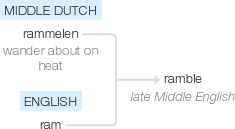Ramble
late Middle English (in ramble (sense 2 of the verb)): probably related to Middle Dutch rammelen, used of animals in the sense ‘wander about on heat’, also to the noun ram.
wiktionary
An altered form (with dissimilation of mm to mb) of dialectal rammle, from Middle English *ramlen, *ramelen, frequentative of Middle English ramen(“to roam, ramble”); compare Swedish ramla(“to stumble; fall; make a noise; rumble”), Danish ramle(“to stumble; collapse; thunder; boom”); equivalent to roam + -le.
"mid-15 c., perhaps frequentative of 'romen' 'to walk, go' perhaps via 'romblen' (late 14 c.) 'to ramble.' The vowel change perhaps by influence of Middle Dutch 'rammelen,' a derivative of 'rammen' 'copulate,' 'used of the night wanderings of the amorous cat.' Meaning 'to talk or write incoherently' is from 1630s" [1].
etymonline
ramble (v.)
mid-15c., ramblen, "to wander, roam about in a leisurely manner," perhaps frequentative of romen "to walk, go" (see roam), perhaps via romblen (late 14c.) "to ramble." The vowel change is perhaps by influence of Middle Dutch rammelen, a derivative of rammen "copulate," "used of the night wanderings of the amorous cat" [Weekley], or the Middle English word might be from the Dutch one. Meaning "to talk or write incoherently" is from 1630s. Related: Rambled; rambling.
ramble (n.)
"a roving, an act of wandering for recreation or pleasure," especially a leisurely walk in varying directions, 1650s, from ramble (v.).
